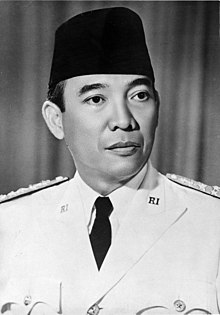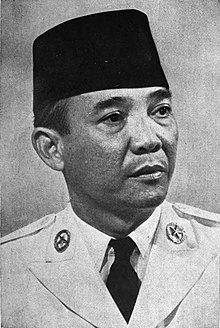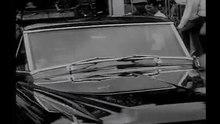Sukarno
Sukarno (in contemporary orthography Soekarno ; born June 6, 1901 in Surabaya , Java , † June 21, 1970 in Jakarta ) was the first president of Indonesia from 1945 to 1967 . In German sources he is also called Achmed Sukarno , an epithet is Bung Karno or Pak Karno ; however, it is not uncommon in Java to have just one name. Sukarno is the father of the future president Megawati Sukarnoputri .
Life
Sukarno founded Perserikatan Nasional Indonesia (PNI) in 1927 , which was renamed Partai Nasional Indonesia in 1928 . As the head of the PNI, Sukarno was, alongside Mohammad Hatta, the central figure in Indonesia's nationalist movement. The PNI refused to cooperate with the Dutch colonial government and wanted to achieve unity of the indigenous population within the borders of the Dutch East Indies colony . Due to a repressive policy of the Netherlands against indigenous independence aspirations in the 1930s, the nationalist movement was heavily regulated in these years. Sukarno and Mohammad Hatta were exiled.
During the Japanese occupation (1942-1945) anti-Western sentiments and pan-Asian nationalism were promoted. During this time Sukarno worked with the Japanese and was able to consolidate his position as the leader of the nationalist movement. He also became a member of the 62-strong commission that met in Jakarta from May 29 to June 1, 1945 to prepare for Indonesia's independence. On the last day of the meeting, Sukarno gave a famous speech in which he introduced the five principles of the Pancasila ideology. It was later published under the title "The Birth of Pancasila".
After the defeat of the Japanese , Sukarno and Hatta proclaimed the Republic of Indonesia on August 17, 1945 and declared independence from the Netherlands. Sukarno became the first President of the Republic of Indonesia on November 13, 1945 and held the post in the 1949-1967 elections.
The Netherlands initially strove to reclaim their colony after World War II and the occupation by the Japanese. However, the renewed annexation failed due to the resistance of a national liberation movement. This was followed by a war by the former colonial rulers against any aspirations for independence, in which around 300,000 people were killed between 1945 and 1949. Most of the victims were on the side of the Indonesian liberation movement. The independence of the Republic of Indonesia was only possible in 1949 after long negotiations with the nationalists about the future President Sukarno and under pressure from Great Britain , the UN and the USA . A loose Dutch-Indonesian Union existed until 1954 , before it was terminated by Sukarno because of the Dutch-Indonesian dispute over West New Guinea .
Domestic politics
Sukarno's rule was based ideologically on the three pillars of nationalism ( Indonesian nasionalisme ), religion ( agama ) and communism ( komunisme ), or Nasakom for short .
The acronym connects the three main political currents of the post-colonial Republic of Indonesia, which had already fought together in the War of Independence against the Dutch willing to return (1945-1949). The political concept of the founder of the state Sukarno thus honors the three social groups (roughly equal in parliamentary terms) with the (guaranteed) possibility of political participation, but also demands their unity.
However, his reign was marked by tensions between communist, nationalist and Islamist forces. Due to increasing tensions, Sukarno relied more and more on the forces of the military to stabilize his power. Politics was strongly oriented towards nationalism in order to stabilize the multi-ethnic state , and economically it was partly based on communism.
From 1959 Sukarno ruled over Indonesia in a “ controlled democracy ” ( Demokrasi Terpimpin ) with increasing authority, with the aim of preserving the national unity of the political camps that were strongly polarized in the context of the Cold War . In 1963 he was elected president for life, ostensibly to preserve the unity of the constituent Indonesian nation, despite the looming violence .
Foreign policy
In terms of foreign policy, Sukarno acted as co-initiator and host of the Bandung Conference (1955), from which the progressive and anti-imperialist movement of the non-aligned states later emerged . In 1963 he rejected the establishment of the neighboring state of Malaysia , which he accused of British imperialism . This led to the so-called " Konfrontasi " between the former colonies. In 1965 Indonesia demonstratively withdrew from the United Nations. to oppose what is known as Nekolim (neocolonialism / imperialism), the continuing influence of the former British colony. In the same year an alleged coup attempt by the Communist Party of Indonesia (PKI) followed , which at the time was democratically legitimized in the Sukarnos unity government. The real background to this upheaval is so far in the dark, but it resulted in a momentous, pro-American and right-wing counter-coup by General Suharto , which killed at least 500,000 to 3 million people and thus wiped out almost the entire left spectrum of Indonesia. (see Massacre in Indonesia 1965–1966 ) President Sukarno was thus practically overthrown, but officially remained in office until shortly before his death in 1967. US influence in supporting the mass murders is likely.
Civil war, pogroms and resignation
Civil war and serious massacres erupted in Indonesia in late 1965 when Suharto and anti-communist generals blamed the Communist Party for the attempted coup in 1965 . The army and Islamic fighters killed hundreds of thousands of communists, alleged supporters and political opponents, and thus almost the entire left spectrum of the young Indonesian nation. At the same time, centuries-old resentment against the Chinese minority broke out and resulted in pogroms against Indonesians of Chinese origin. (See Massacre in Indonesia 1965–1966 .) As a result, Suharto, supported by the American Central Intelligence Agency (CIA) and presumably also by the German Federal Intelligence Service (BND), gained more and more interpretative sovereignty, was able to reinterpret the coup in his favor Gradually disempower Sukarno. The exact circumstances of the events at that time, which both had internal Indonesian causes and were conducted as a proxy conflict in the context of the East-West confrontation , have not yet been clarified. Sukarno finally officially resigned on February 22, 1967 and was placed under house arrest.
Works
- Nationalism, Islam and Marxism. Translated by Karel H. Warouw and Peter D. Weldon. Modern Indonesia Project, Ithaca, New York 1970. (Based on a series of articles Sukarno published in Indonesian in 1926).
- Indonesia vs Fasisme. Pen. Media Pressindo, Yogyakarta 2000. (Political analysis of Indonesian nationalism in contradiction to fascism. Based on a series of articles published in Indonesian by Sukarno in 1941).
literature
- Bernhard Dahm : Sukarno's struggle for Indonesia's independence. Career and ideas of an Asian nationalist. (= Studies on the Sociology of the Revolution. 2). Metzner, Frankfurt am Main and others 1966.
- Dieter Goetze : Castro - Nkrumah - Sukarno. A comparative sociological study on the structural analysis of charismatic political leadership . Reimer, Berlin 1977.
- Bob Hering: Soekarno. Founding father of Indonesia 1901–1945. (= Negotiating van het Koninklijk Instituut voor Taal-, Land- en Volkenkunde. 192). KITLV Press, Leiden 2002, ISBN 90-6718-191-9 .
- John D. Legge: Sukarno. A political biography . Allen et al. Unwin, Sidney et al. 1985, ISBN 0-86861-463-7 .
- Rex Mortimer: Indonesian communism under Sukarno. Ideology and politics, 1959-1965 . Cornell Univ. Press, Ithaca, London et al. 1974, ISBN 0-8014-0825-3 .
- John Subritzky: Confronting Sukarno. British, American, Australian and New Zealand diplomacy in the Malaysian-Indonesian confrontation, 1961-5 . Macmillan et al., London 2000, ISBN 0-312-22784-1 .
- S. Noma (Ed.): Sukarno . In: Japan. An Illustrated Encyclopedia. Kodansha, 1993. ISBN 4-06-205938-X , p. 1469.
- Franklin B. Weinstein: Indonesian foreign policy and the dilemma of dependence. From Sukarno to Soeharto . (= Politics and international relations of Southeast Asia ). Cornell Univ. Pr., Ithaca et al. 1976, ISBN 0-8014-0939-X .
- Carl Weiss : Sukarnos Thousand Islands. Indonesia - The directed democracy . Wegner, Hamburg 1963.
Web links
- Works by and about Sukarno in the German Digital Library
- Newspaper article about Sukarno in the 20th century press kit of the ZBW - Leibniz Information Center for Economics .
- June 8th, 1946: Indonesia against colonial power. Calendar sheet
- Season of the cleaver. Indonesia 1965. Anti-communist pogrom with more than 100,000 dead - the case of President Ahmed Sukarno. In: Friday. July 21, 2000.
- Indonesia / Balance: Oil in the base. In: Der Spiegel. June 29, 1970.
Individual evidence
- ↑ for example: Brother Karno or Mr. Karno
- ^ BJ Boland: The Struggle of Islam in Modern Indonesia. Martinus Nijhoff, The Hague 1971. Reprint 1982, pp. 17-23.
- ↑ Ute Becker: The Chronicle: History of the 20th Century to Today . Wissen Media Verlag, Gütersloh 2006, ISBN 3-577-14641-9 , p. 320.
- ↑ Naomi Klein: The shock doctrine: the rise of disaster capitalism . Penguin Books, London 2007, ISBN 978-0-14-102453-0 .
- ↑ Jonas Mueller-Töwe: The genocide and Germany's secret help. t-online, July 13, 2020
| personal data | |
|---|---|
| SURNAME | Sukarno |
| ALTERNATIVE NAMES | Sukarno, Achmid; Soekarno |
| SHORT DESCRIPTION | Indonesian politician |
| DATE OF BIRTH | June 6, 1901 |
| PLACE OF BIRTH | Surabaya |
| DATE OF DEATH | June 21, 1970 |
| PLACE OF DEATH | Jakarta |


